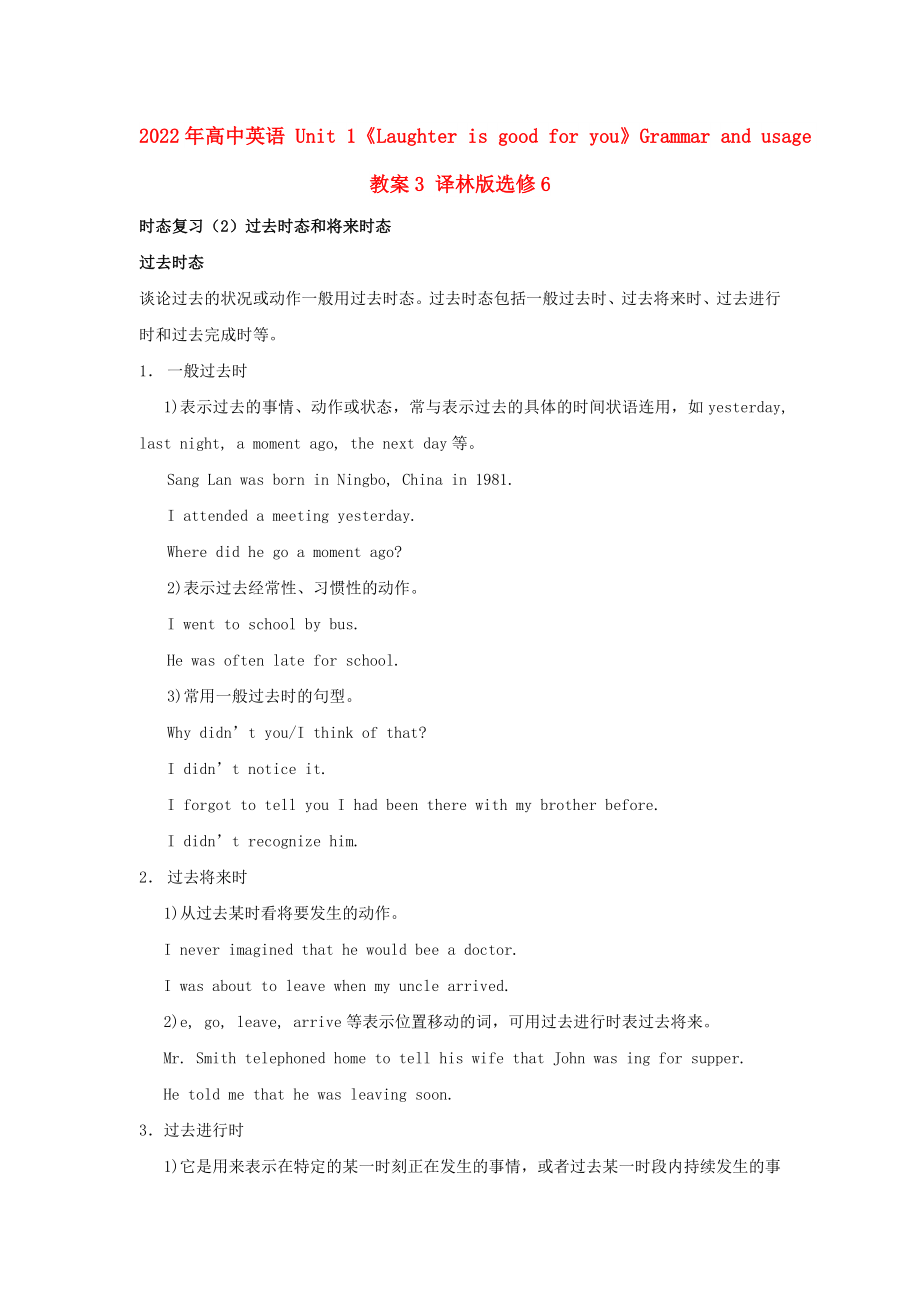《2022年高中英語 Unit 1《Laughter is good for you》Grammar and usage教案3 譯林版選修6》由會員分享�����,可在線閱讀,更多相關《2022年高中英語 Unit 1《Laughter is good for you》Grammar and usage教案3 譯林版選修6(3頁珍藏版)》請在裝配圖網(wǎng)上搜索�����。
1��、2022年高中英語 Unit 1《Laughter is good for you》Grammar and usage教案3 譯林版選修6
時態(tài)復習(2)過去時態(tài)和將來時態(tài)
過去時態(tài)
談論過去的狀況或動作一般用過去時態(tài)�����。過去時態(tài)包括一般過去時����、過去將來時、過去進行時和過去完成時等����。
1. 一般過去時
1)表示過去的事情、動作或狀態(tài)�����,常與表示過去的具體的時間狀語連用��,如yesterday, last night, a moment ago, the next day等��。
Sang Lan was born in Ningbo, China in 1981.
I attended a
2����、 meeting yesterday.
Where did he go a moment ago?
2)表示過去經(jīng)常性、習慣性的動作�。
I went to school by bus.
He was often late for school.
3)常用一般過去時的句型。
Why didn’t you/I think of that?
I didn’t notice it.
I forgot to tell you I had been there with my brother before.
I didn’t recognize him.
2. 過去將來時
1)從過去
3�、某時看將要發(fā)生的動作。
I never imagined that he would bee a doctor.
I was about to leave when my uncle arrived.
2)e, go, leave, arrive等表示位置移動的詞�����,可用過去進行時表過去將來����。
Mr. Smith telephoned home to tell his wife that John was ing for supper.
He told me that he was leaving soon.
3.過去進行時
1)它是用來表示在特定的某一時刻正在發(fā)生的事情,或
4�、者過去某一時段內持續(xù)發(fā)生的事情。主要從點和段上來強調動作的過去進行時����。
What were you doing at nine last night?
I first met Lisa three years ago. She was working at the radio shop at that time.
2)表示過去某一階段內一直在進行的動作。
I was reading a novel last night.
As she was reading the newspaper, her sister was doing her homework
5��、.
4.用過去完成時
1)在某一過去時間以前或過去某事之前已發(fā)生并完成的動作�����。
By the end of last month they had treated 3,000 patients.
By the time she peted in the New York Goodwill Games, she had been a dedicated junior gymnast for eleven years.
2)表示一種未實現(xiàn)的愿望和想法����。
I had hoped to go on Monday, but I couldn’t get away.
I had though
6�����、t that he was our English teacher.
3)用與Hardly…when, Scarcely…when, No sooner…than句型中��。
Hardly had he finished his homework when we went home.
將來時態(tài)
談論將來的狀況或動作一般用將來時態(tài)����。將來時態(tài)包括一般將來時�����、將來進行時和將來完成時等�����。
1. 一般將來時
一般將來時表示將來發(fā)生的動作或情況����。常與表示將來的時間狀語連用�,如tomorrow, next week等����。
She will e with us to watch a football
7�、match tomorrow.
有幾種方法可以表示一般將來。
(1) 用will或shall表示有關將來的信息
I know I will think about her whenever my life feels unbearable.
I shall work hard and learn to bee a gymnast.
(2)用be going to+動詞原形表示將來的計劃和打算
Today, I’m going to talk about how to find happiness.
(3) be to+動詞原形“按計劃��、安排”就要發(fā)生
The li
8����、ne is to be opened to traffic on May Day.
(4) be about to表示即將要發(fā)生的事
He is about to retire.
2. 將來進行時
表示將來某一時間點或時間段正在進行的動作。
Dr Brain will be talking about success next time.
What will you be doing at eight tomorrow evening?
I wonder if it will still be raining this afternoon.
3.將來完成時
表示將來某一時間之前已經(jīng)完成的動作�����,并往往對將來某一時間產(chǎn)生影響����。
When you get home, you father will have left for America.
By the end of next month he will have finished his novel.
 2022年高中英語 Unit 1《Laughter is good for you》Grammar and usage教案3 譯林版選修6
2022年高中英語 Unit 1《Laughter is good for you》Grammar and usage教案3 譯林版選修6

